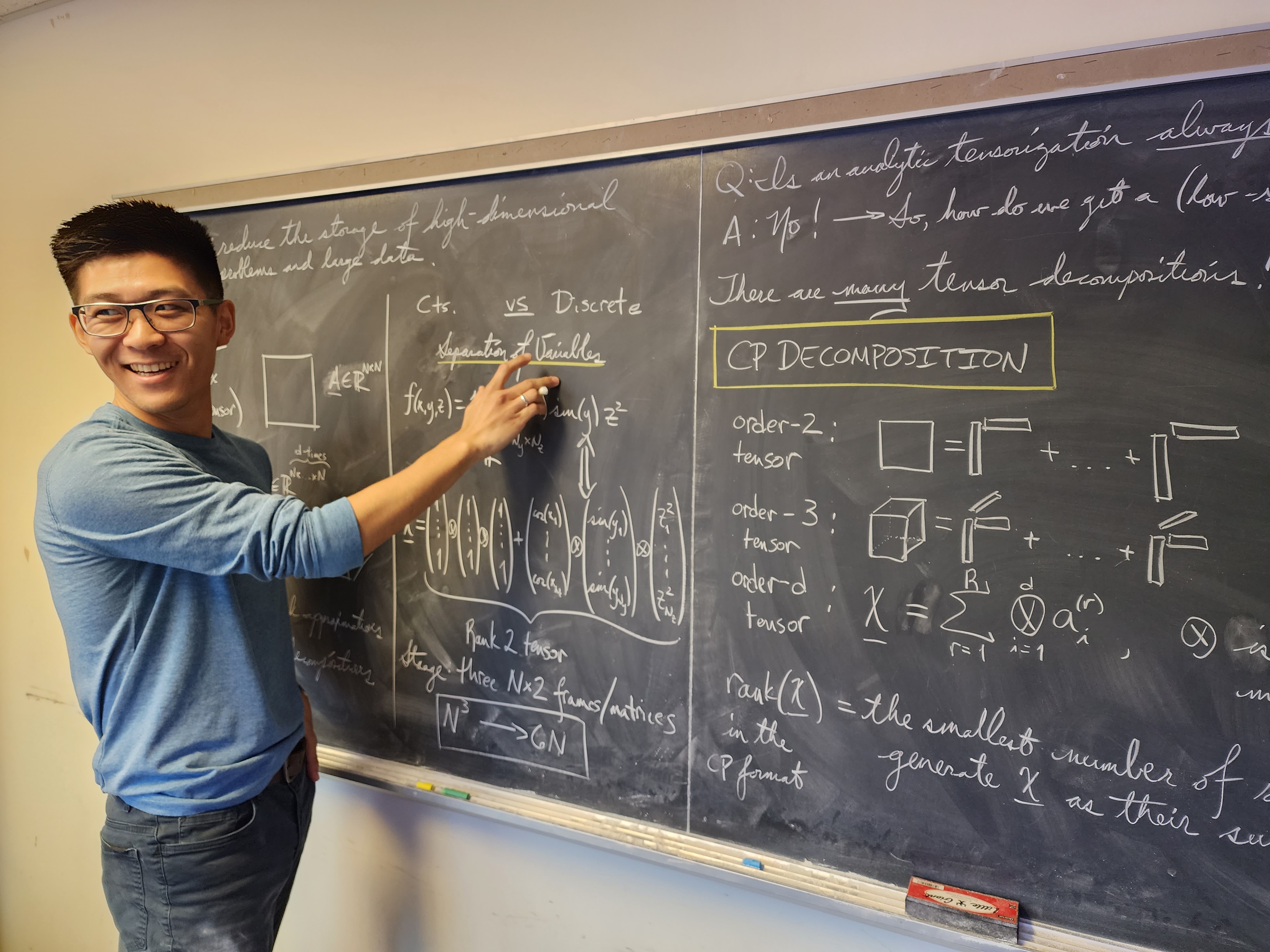
Teaching
"Sometimes, thirty minutes of your time is more valuable to your students than it is to you."Courses Taught (Swarthmore College)
Instructorships
- Spring 2026 -- MATH 34 (several variable calculus)
- Spring 2026 -- MATH 93 (numerical methods for hyperbolic conservation laws; directed reading)
- Fall 2025 -- MATH 66 (numerical and stochastic methods)
- Fall 2025 -- MATH 93 (preparation for the mathematical contest in modeling; directed reading)
- Spring 2025 -- MATH 43 (basic differential equations)
- Spring 2025 -- MATH 54 (partial differential equations)
- Spring 2024 -- MATH 93 (low-rank tensor decompositions; directed reading)
- Fall 2024 -- MATH 25 (single variable calculus 2 for natural sciences and engineering)
- Fall 2024 -- MATH 93 (computational mathematics with MATLAB; directed reading)
- Spring 2024 -- MATH 93 (computational mathematics with MATLAB; directed reading)
- Spring 2024 -- MATH 43 (basic differential equations)
- Fall 2023 -- MATH 25 (single variable calculus 2 for natural sciences and engineering)
Courses Taught (University of Delaware)
Instructorships
- Winter 2023 -- MATH 243 (calculus 3 for physical sciences and engineering with lab component) Download evaluations here
- Winter 2022 -- MATH 243 (calculus 3 for physical sciences and engineering with lab component) Download evaluations here
- Winter 2021 -- MATH 221 (calculus 1 for life sciences and business) Download evaluations here
- Winter 2020 -- MATH 221 (calculus 1 for life sciences and business) Download evaluations here
- Fall 2022 -- MATH 243 (calculus 3 for physical sciences and engineering with lab component) Download evaluations here
- Fall 2021 -- MATH 243 (calculus 3 for physical sciences and engineering with lab component) Download evaluations here
- Fall 2020 -- MATH 243 (calculus 3 for physical sciences and engineering with lab component) Download evaluations here
- Spring 2020 -- MATH 221 (calculus 1 for life sciences and business) Download evaluations here
- Fall 2019 -- MATH 221 (calculus 1 for life sciences and business) Download evaluations here
- Spring 2019 -- MATH 241 (calculus 1 for physical sciences and engineering with lab component) Download evaluations here
- Fall 2018 -- MATH 221 (calculus 1 for life sciences and business) Download evaluations here
- Summer 2021 -- Graduate qualifying exam review for techniques of applied mathematics (3 out of 3 students passed)
- Winter 2021 -- Graduate qualifying exam review for techniques of applied mathematics (2 out of 2 students passed)
Ingredients for an Effective Teacher
- Show compassion
- Make sure your students are heard, included, and less alone
- Be enthusiastic!
- Prepare ahead of time
- Take charge
- Connect the mathematics to the real world
- Acknowledge when you don't have an answer
My Teaching Philosophy
Over my years of teaching (as instructor, teaching assistant, and tutor), I have developed a working philosophy on how to build an inviting and constructive atmosphere for students that I help. At its core, I believe that the key to helping a student reach their greatest potential is to show (com)passion and be well articulated. To be an effective teacher, one must not only be well-versed in a specified topic, but also care about their students' education. For a student, thirty minutes of my time might be more important to them than it is to me. Therefore, although not always feasible, I try my best to accommodate my students. I enjoy discussing new ideas in (applied) mathematics education with other mathematics educators!
With compassion comes creating a safe learning environment where students feel heard, included, and less alone. These three points of conversation apply in many different ways! They could simply apply to a student feeling lost in the material. Does the student feel their concerns are heard? Does the student feel included in group assignments despite feeling lost? Does the student know that they are (surely) not alone in how they feel? Furthermore, these three points could apply to students from historically marginalized groups (e.g., female, Black, Latinx, LGBTQ+). Do these students feel heard? Do these students feel included? Do these students know they are not alone? I have found that creating a learning atmosphere that embodies this principles helps students feel comfortable being themselves and raising concerns.
As the world evolves, issues surrounding social justice and environmentalism are becoming increasingly important. Mathematics educators have a responsibility to engage students with these topics, educating the whole person and empowering leaders for a just and humane world. The traditional physics-based examples, although important, are by themselves no longer sufficient in a world where students are becoming increasingly exposed to climate change, racism, sexism, gun violence, gentrification, etc... It's not enough to just make the mathematics interesting. We also need to make the mathematics human. For example, an example in a calculus/differential equations class is modeling anthropogenic carbon emissions. However, you can take it a step further -- get students to think about the ethical, societal, and environmental implications of the mathematics (e.g., habitat destruction, rising sea levels, higher food prices, increasing numbers of climate refugees, food shortages that disproportionately affect poorer people). Several examples to help you get started can be found in the fantastic book, Mathematics for social justice: Resources for the college classroom by G. Karaali and L.S. Khadjavi.
My teaching style involves a cycle of "review, demonstrate, practice, clarify". I first review current material; then, I demonstrate an example; after my demonstration, students then attempt a practice problem; any questions or concerns are then clarified, hopefully to the students' satisfaction.